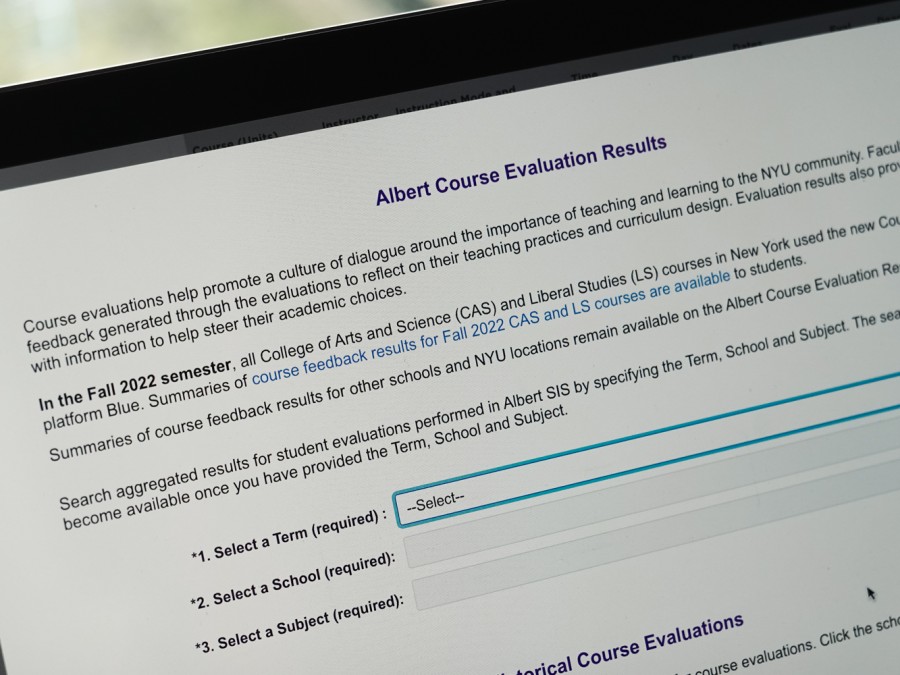Opinion: Sick of misleading Rate My Professors reviews? Use NYU’s tool instead.
Save yourself from a 5.0 professor who is actually a 1.9.
The course evaluation results can be accessed at the bottom of Albert’s homepage. (Kevin Wu for WSN)
April 25, 2023
With course registration season upon us, everyone’s scrambling to find classes that fit their schedules and major requirements, and doing their best to avoid being stuck with that one professor — the one everyone told you to steer clear from at all costs.
The instructors with reputations are somewhat easy to avoid, though. Other, newer faculty members can sometimes escape notoriety, even after a thorough search through the comments on RateMyProfessors.com. A better option for avoiding a professor that could ruin your semester is NYU’s course feedback system, which allows students to see ratings of professors on Albert from as far back as spring 2018.
The system is not perfect — the ratings are not yet published on Albert for all courses — but its accuracy just might save your GPA.
While the beloved Rate My Professors is a website where anyone — literally anyone — can review faculty members, the university’s course feedback, previously known as course evaluations, provides a more consistent and university specific option. Although the former is more pleasing in design, NYU’s in-house system provides more relevant and up-to-date reviews.
The improved accuracy of the university’s course feedback over Rate My Professors can be attributed in part to each student having the same opportunity to offer input for every course and professor. Professors often encourage students to complete course evaluations, even sometimes providing time to complete them in class. This means that you get a balanced whole-class perspective with the course feedback system, rather than the mix of rave reviews and horror stories on the Rate My Professors website.
There is also a greater guarantee of quality with NYU’s system, as the university has a direct interest in improving courses for its students. NYU analyzes course feedback data in order to pinpoint areas where instructors excel and to adjust courses as necessary, so it is to its benefit to invest in the quality of the system. Rate My Professors is likely more interested in increasing traffic on its website than making sense of what students are saying in the comments section, so it doesn’t feel the need to subject itself to the same level of oversight and quality control.
Not only is it of a higher quality, but NYU’s system also creates a more comprehensive picture of a course than Rate My Professors. With course feedback, students can learn about the caliber of the course material, the number of hours students spent on classwork, a course’s structure and the quality of the instructor. Rate My Professors only provides less specific information, like a general rating of how much students liked a professor, the course’s level of difficulty, whether or not students would take a course again and if attendance for the class was mandatory.
Professors are also much more likely to go through course evaluations than look themselves up on Rate My Professors, meaning feedback from NYU’s system will probably make a bigger difference than a comment left on the review website. Many Rate My Professors reviews seem to be saying the same thing over and over, sometimes going back years. NYU’s system allows students to have more direct communication with professors that helps make sure a course improves each time it’s offered.
If you truly want 5.0 professors, listen to the painstakingly gathered course evaluation information NYU has graciously provided for you. A better course registration experience already exists — one that won’t have you kicking yourself for trusting strangers on the internet with your schedule halfway through the semester.
WSN’s Opinion section strives to publish ideas worth discussing. The views presented in the Opinion section are solely the views of the writer.
Contact Molly Koch at [email protected].

























































































































































